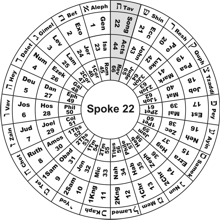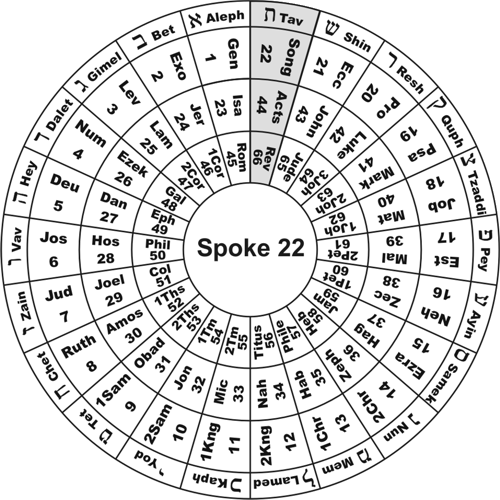The Bride of Christ
And I heard as it were the voice of a great multitude, and
as the voice of many waters, and as the voice of mighty thunderings, saying,
Alleluia: for the Lord God omnipotent reigneth. Let us be glad and rejoice,
and give honour to him: for the marriage of the Lamb is come, and his wife
hath made herself ready.
Revelation 19:6f (Spoke 22, Cycle 3)
The Hebrew word for a Bride or Spouse is כלה (kallah). In the unpointed
Hebrew text, this word appears identical to a word that means end, completion, or
consummation, as discussed in the Consummation of Creation.
And both words are cognate with the word כל (kol, all/whole).
This is the wisdom of God! Just as a natural man finds his completion in his bride so
the Bible and all reality is consummated when God receives His Bride, the
Church. This is the primary theme of Spoke 22. It manifests in the major
themes of all three Cycles:
| Song of Solomon: | The Marriage Song, when a
King receives his bride. This is the most physical manifestation of
the theme.
| | Acts: | The Birth of the Church, the Bride of
Christ the King.
| | Revelation: | The Marriage of the Lamb, when Christ receives His
bride. |
Kallah is used six times in the Song of Solomon as God
metaphorically declares his love for his
church as the love between a man and his spouse. Here are four such occurrences where the
highlighted words are translated from the Hebrew kallah (vss. 4.8f):
Come with me from Lebanon, my spouse, with me from Lebanon: look from the top of Amana,
from the top of Shenir and Hermon, from the lions' dens, from the mountains of the leopards.
Thou hast ravished my heart, my sister, my spouse; thou hast ravished
my heart with one of
thine eyes, with one chain of thy neck. How fair is thy love, my sister, my spouse!
how much better
is thy love than wine! and the smell of thine ointments than all spices! Thy lips, O my
spouse, drop as the honeycomb: honey and milk are under thy tongue; and the smell of thy
garments is like the smell of Lebanon.
The word kol (all) (spelt Kaph Lamed)
is intimately related to et - את -
(Aleph Tav) through a natural symmetry on the Wheel. Beginning at the center,
follow the figure 8 to see how Aleph-Tav is interwoven with Kaph-Lamed to spell
את-כל (et-kol, the Sign of Everything,
BW book pg 89):

This is the Wisdom of God encoded in the Hebrew language, designed in perfect harmony
with all His great creations - from Man to the Cosmos - which were finished on the
Sixth Day:
And God saw every thing (et-kol) that he had made, and, behold,
it was very good. And the evening and the morning were the sixth day.
Genesis 1:31
The Seventh Day: Insights from the Gematria Reference
The Seventh day, the consummation of the week, is:
The Sabbath (השבת, HaShabbat) = 707
Note the integration of the semantic and numeric values.
The Number 707 also relates to the ancient rabbinical teaching that
treats the Sabbath as a Wife, a man's consummation and completion. This is an ancient tradition,
found in the Talmud (Shabbat 119a):
R. Hanina robed himself and stood
at sunset of Sabbath eve and exclaimed, "Come and let us go forth to
welcome the queen Sabbath."
R. Yannai donned his robes on Sabbath eve and exclaimed, "Come, O bride, Come, O bride!"
This coheres with the value of "his wife" found in Genesis 3:20:
אשתו (Eshto, His Wife (Gen 3:20)) = 707
This last phrase of the last verse in the last book of Cycle 1 - Song of Solomon -
also yields the value 707:
Upon the mountains of spices
על הרי בשמים
Al Hari Basamim |
= 707 |
What better way to end the Marriage Song and the first Cycle of Aleph-Tav?
Indeed, this is the image of the Consummation of Creation, when
Christ will receive His Bride and the Universe will enter into its everlasting
Sabbath. We have a three-fold set:
| The Number 707 |
The Sabbath |
| His Wife |
| Upon the mountain of spices |
| 


